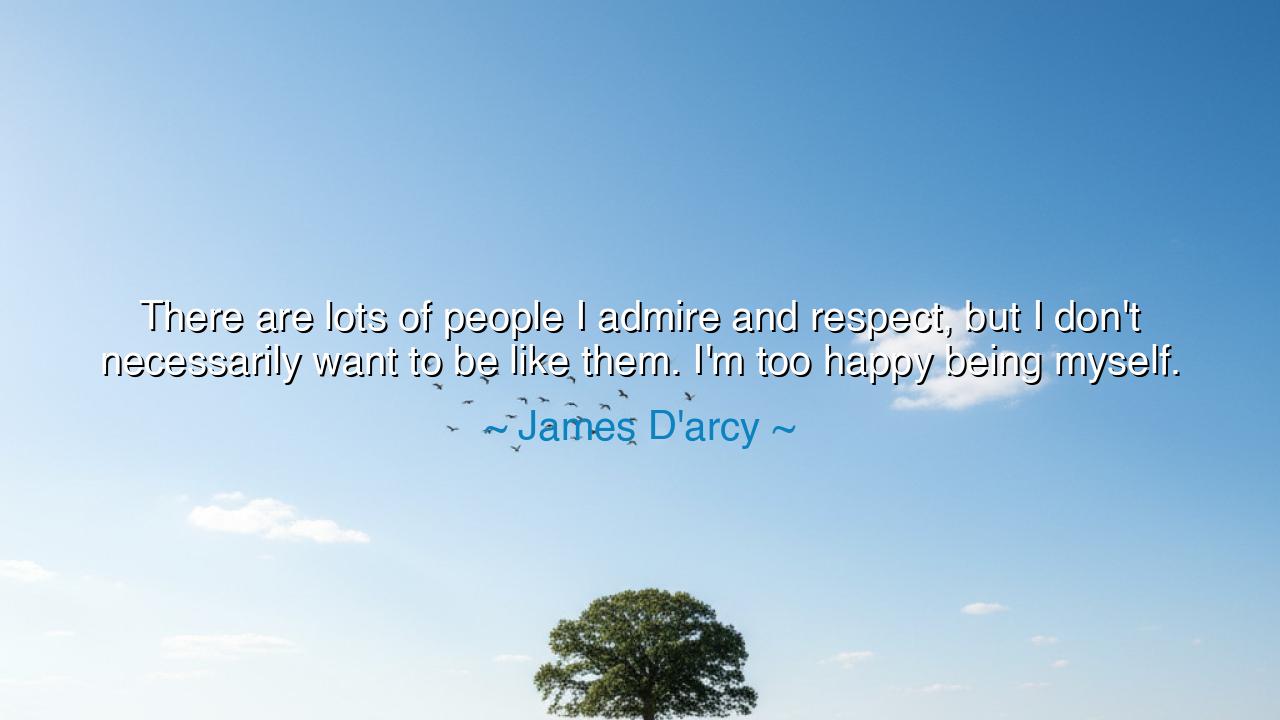
There are lots of people I admire and respect, but I don't
There are lots of people I admire and respect, but I don't necessarily want to be like them. I'm too happy being myself.






"There are lots of people I admire and respect, but I don't necessarily want to be like them. I'm too happy being myself," says James D'arcy, a profound statement that calls us to reflect on the eternal struggle between individuality and the temptation to imitate others. In a world where it is all too easy to look at others and wish for their successes, their talents, or their lives, these words serve as a beacon of self-acceptance and the deep contentment found in embracing one's own path. To be true to oneself, to honor one’s own journey, and to find joy in being who we are—this, as the ancients knew, is the highest form of wisdom.
The ancient Greek philosophers, particularly Socrates and Diogenes, espoused a similar idea. Socrates, known for his wisdom, was adamant that the only life worth living was one of self-examination and authenticity. He did not strive to be like others or to conform to the prevailing norms of society; rather, he sought to know himself, to be true to his nature, and to cultivate a life of virtue. For Socrates, the key to happiness was not in imitating others but in understanding oneself and living with integrity. Diogenes, too, chose to reject societal expectations and live freely, content in his own simplicity, teaching us that true happiness lies in being yourself, not in aspiring to the lives of others.
This idea also echoes in the story of the Buddha, who left his royal life to seek enlightenment, not by adopting the ways of others, but by searching inwardly for answers. Despite the temptations of wealth and power that surrounded him, the Buddha’s true contentment came not from the trappings of kingship but from the peaceful acceptance of his true self. He understood that happiness is found not by emulating others, but by understanding one’s own nature and living in harmony with it. In this, we see that the pursuit of self-authenticity is an ancient and sacred path, one that leads not to mimicry, but to freedom.
The story of the great artist Michelangelo also provides insight into the wisdom of embracing one’s own path. Though he admired the works of other artists, he was always true to his own vision. He did not imitate others for the sake of popularity, but instead poured his soul into creating works that expressed his unique genius. It was his authenticity, his willingness to trust his own instincts, that made his creations timeless. In this, Michelangelo teaches us that greatness is not found in becoming like someone else, but in embracing our own voice and gifts.
In our own lives, we often fall prey to the temptation of comparison. We look to others—whether they are colleagues, celebrities, or even friends—and think, “If only I could be like them.” But in doing so, we deny ourselves the joy that comes from fully inhabiting our own identity. As James D’arcy suggests, there is a profound freedom in accepting that we do not need to mimic others in order to succeed or to feel fulfilled. Respect for others and admiration for their achievements is important, but it should not be a measure of our own worth or a template for how we should live.
The lesson here is simple yet powerful: happiness is not found in trying to be like someone else, but in celebrating the individuality that makes us unique. The more we embrace our own journey, the more we come to understand that our path is just as valuable, just as meaningful, as anyone else’s. We need not seek to replicate the successes of others but to create our own definition of success, one that is aligned with our values, passions, and true self.
So, let us honor the wisdom of James D’arcy and the ancient teachings that remind us: contentment comes not from imitation, but from authenticity. By embracing our own nature, by respecting our individual journey, and by finding joy in who we truly are, we unlock the greatest source of happiness. As the ancient sages taught, to know yourself, to be yourself, is the truest form of wisdom and the most lasting path to peace.






AAdministratorAdministrator
Welcome, honored guests. Please leave a comment, we will respond soon